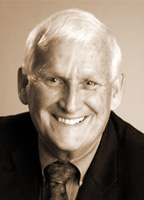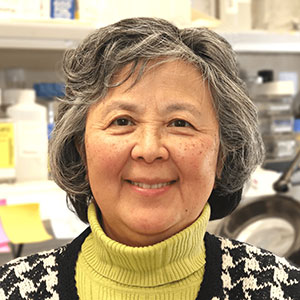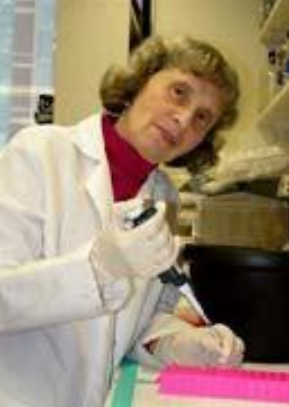Related Research Articles
The National Digestive Diseases Information Clearinghouse (NDDIC) is an information dissemination service of the National Institute of Diabetes and Digestive and Kidney Diseases (NIDDK). The NIDDK is part of the National Institutes of Health, which is under the U.S. Department of Health and Human Services.
The Endocrine and Metabolic Diseases Information Service is an information dissemination service of the National Institute of Diabetes and Digestive and Kidney Diseases (NIDDK). The NIDDK is part of the National Institutes of Health, which is part of the U.S. Department of Health and Human Services.

George L. Blackburn was the S. Daniel Abraham Professor of Nutrition and associate director of the division of nutrition at Harvard Medical School. He was also director of the Center for the Study of Nutrition Medicine (CSNM) in the Roberta and Stephen R. Weiner Department of Surgery, and director of the new Feihe Nutrition Laboratory at Beth Israel Deaconess Medical Center (BIDMC), Boston, Massachusetts.

Karen Teff is a biologist and geneticist. She received her education in Canada and has since been working in the United States. Teff has spent most of her career studying the effects of diabetes and other related diseases on humans.
This article provides a global overview of the current trends and distribution of metabolic syndrome. Metabolic syndrome refers to a cluster of related risk factors for cardiovascular disease that includes abdominal obesity, diabetes, hypertension, and elevated cholesterol.
Barry Michael Popkin is an American nutrition and obesity researcher at the Carolina Population Center and the W.R. Kenan Jr. Distinguished Professor of Nutrition at the University of North Carolina at Chapel Hill School of Public Health, where he is the director of the Global Food Research Program. He developed the concept of "nutrition transition". He is the author of over 650 journal articles and a book, The World is Fat, translated into a dozen languages.
The National Institute of Diabetes and Digestive and Kidney Diseases (NIDDK) is part of the United States National Institutes of Health, which in turn is part of the Department of Health and Human Services. NIDDK is approximately the fifth-largest of the 27 NIH institutes. The institute's mission is to support research, training, and communication with the public in the topic areas of "diabetes and other endocrine and metabolic diseases; digestive diseases, nutritional disorders, and obesity; and kidney, urologic, and hematologic diseases". As of 2021, the Director of the institute is Griffin P. Rodgers, who assumed the position on an acting basis in 2006 and on a permanent basis in 2007.
Jay Houston Hoofnagle is an American Doctor of Medicine. He is a leading expert in hepatotoxicity, hepatitis, cirrhosis and other diseases of the liver, and director of the Liver Disease Research Branch in the Division of Digestive Diseases and Nutrition at the National Institutes of Health.
Robert H. Eckel is an American endocrinologist. He holds the Charles A. Boettcher II Endowed Chair in atherosclerosis at the University of Colorado Denver, where he is also a professor of medicine and professor of physiology and biophysics. In 2016 Eckel was among the recipients of the Laureate Awards of the Endocrine Society, as Outstanding Clinical Investigator. He has done significant research in the biology and pathophysiology of lipoprotein lipase.
Attila Szabo is a biophysicist who is a Distinguished Investigator and Section Chief of the Theoretical Biophysical Chemistry Section in the Laboratory of Chemical Physics at the National Institute of Diabetes and Digestive and Kidney Diseases, part of the United States National Institutes of Health.

Catherine Christine Cowie is an American epidemiologist. She is a program director and senior advisor at the National Institute of Diabetes and Digestive and Kidney Diseases.

Judith E. Fradkin is an American physician-scientist. She was the director of the Division of Diabetes, Endocrinology, and Metabolic Diseases at the National Institute of Diabetes and Digestive and Kidney Diseases from 2000 to 2018.

Carole Ann Bewley is an American chemist. She is a senior investigator and Chief of the Laboratory of Bioorganic Chemistry at the United States National Institute of Diabetes and Digestive and Kidney Diseases. Bewley researches secondary metabolites and basic principles involved in protein-carbohydrate interactions and how these can be exploited to engineer therapeutics.

Deborah Meetze Hinton is an American microbiologist. She is a senior investigator and chief of the gene expression and regulation section in the laboratory of cell and molecular biology at the National Institute of Diabetes and Digestive and Kidney Diseases.

Vera Marie Nikodem was a Czechoslovak-American molecular biologist who served as a section chief at the National Institute of Diabetes and Digestive and Kidney Diseases.

Christine M. Hunter is an American clinical psychologist and a uniformed service officer. She is the acting National Institutes of Health (NIH) associate director for behavioral and social sciences research and acting director of the NIH Office of Behavioral and Social Sciences Research. Hunter was an active duty officer in the U.S. Air Force from 1996 to 2006. She is a captain in the U.S. Public Health Service Commissioned Corps.

Constance Tom Noguchi is a research physicist, Chief of the Molecular Cell Biology Section, and Dean of the Foundation for Advanced Education in the Sciences (FAES) Graduate School at the National Institute of Diabetes and Digestive and Kidney Diseases (NIDDK) of the National Institutes of Health (NIH). Noguchi studies the underlying genetics, metabolism, and treatment of sickle cell disease and of erythropoietin and its effects on metabolism.

Nancy Ruth Goldman Nossal was an American molecular biologist specialized in the study of DNA replication. She was chief of the laboratory of molecular and cellular biology at the National Institute of Diabetes and Digestive and Kidney Diseases from 1992 to 2006.
Melinda Annetta Beck is an American nutritionist and professor at the Gillings School of Global Public Health at the University of North Carolina at Chapel Hill where she also serves as interim department chair. Her research investigates the relationship between nutrition and immune response to infectious disease. She was elected Fellow of the American Association for the Advancement of Science in 2022.

Elizabeth "Beth" Mayer-Davis is an American nutritionist who is the Cary C. Boshamer Distinguished Professor at the UNC Gillings School of Global Public Health. She is the Director of the University of North Carolina at Chapel Hill Nutrition Obesity Research Center, and Dean of the UNC Graduate School. She has sought to better understand diabetes. She was awarded the 2019 American Diabetes Association Kelly West Award.
References
- ↑ "Penny Gordon-Larsen Named Vice Chancellor for Research". UNC Research. July 5, 2023.
- ↑ "Distinguished professorships go to 58 faculty members". University of North Carolina at Chapel Hill. Retrieved June 15, 2024.
- ↑ "Penny Gordon-Larsen". Carolina Population Center. Retrieved May 18, 2020.
- ↑ Rao, Anita (July 12, 2018). "Being Heavy Affects More Than Your Health". WUNC.
- ↑ "Americans Blame Obesity on Willpower, Despite Evidence It's Genetic". The New York Times. November 1, 2016.
- ↑ Hellmich, Nanci (January 8, 2009). "Gain a Spouse and You'll Likely Gain Pounds Too". ABC News.
- 1 2 "Penny Gordon-Larsen, PhD • UNC Gillings School of Global Public Health". UNC Gillings School of Global Public Health. Retrieved 2019-05-08.
- ↑ "Clinical Obesity Research Panel | NIDDK". National Institute of Diabetes and Digestive and Kidney Diseases. Retrieved 2019-05-08.
- ↑ Gordon-Larsen, Penny; Heymsfield, Steven (April 10, 2018). "Obesity as a Disease, Not a Behavior". Circulation. 137 (15): 1543–1545. doi: 10.1161/CIRCULATIONAHA.118.032780 . PMID 29632150.
- ↑ Gordon-Larsen, Penny; Nelson, Melissa C.; Page, Phil; Popkin, Barry M. (2006-02-01). "Inequality in the Built Environment Underlies Key Health Disparities in Physical Activity and Obesity". Pediatrics. 117 (2): 417–424. doi:10.1542/peds.2005-0058. ISSN 0031-4005. PMID 16452361. S2CID 5925679.
- ↑ The, Natalie S.; Suchindran, Chirayath; North, Kari E.; Popkin, Barry M.; Gordon-Larsen, Penny (2010-11-10). "Association of Adolescent Obesity With Risk of Severe Obesity in Adulthood". JAMA. 304 (18): 2042–7. doi:10.1001/jama.2010.1635. ISSN 0098-7484. PMC 3076068 . PMID 21063014.
- ↑ "2018 Winners". UNC Research.
- ↑ "UNC Appoints Gordon-Larsen Associate Dean for Research". Association of Schools & Programs of Public Health. November 9, 2018.
- ↑ Calloway, Jane (January 4, 2021). "Focus Carolina: Penny Gordon-Larsen". thewell.unc.edu/. Retrieved January 19, 2021.
- ↑ "NIDDK Advisory Council: Members". niddk.nih.gov. Retrieved January 19, 2021.
- ↑ "Penny Gordon-Larsen". endeavors.unc.edu. August 8, 2018. Retrieved January 19, 2021.